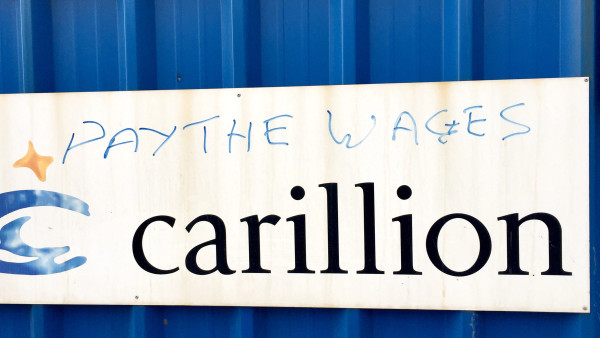

Scottish investment firm Kiltearn Partners, which owned 10 per cent of Carillion, was considering suing the contractor over suspicions that its directors knew the company was in trouble.
The position of the collapsed company shareholders were revealed today (19 February) by MPs on the work and pensions and the business, energy and industrial strategy (BEIS) committees, which published responses from heads of some of the top fund and wealth firms in the UK.
Murdoch Murchison, chief executive of Kiltearn, told the committees the firm believed there were "clear grounds for an investigation into whether Carillion's management knew, or should have known, about the need for a £845m provision due to receivables on its construction business earlier than July 2017".
If the failed contractor had not gone into liquidation, Kiltearn would have "considered participation in civil legal action against Carillion with a view to recovering a proportion of its clients' crystalised losses," he added.
After unsuccessful talks with its lenders and the UK government, Carillion made an application on 15 January to the High Court for compulsory liquidation.
Carillion, which employs about 43,000 people, had been struggling for several months, issuing a profit warning last year that sank its share price – which has fallen from more than £2 a year ago to about 14.2p just before it went into administration.
Standard Life Aberdeen chief executives Martin Gilbert and Keith Skeoch told the MPs that the firm started a process of divestment from Carillion in December 2015 due to concerns about financial management, strategy and corporate governance, which they raised with the board in regular meetings from then until they sold up completely in July 2017.
"It was felt that the management was not giving sufficient weight to the probability that trading may deteriorate further or to the downside risk from this scenario given the high level of debt. The board showed no inclination to drive the management to change," the firm said in a briefing note.
BlackRock, on the other hand, explained its divestment strategy due to the fact of being an index-tracking fund manager, and the contractor's weighting being reduced in these indices.
For example, the company was deleted from the FTSE UK Dividend Plus, published by FTSE Russell, following its suspension of dividends last July, BlackRock said.
According to Labour MP Frank Field, chair of the work and pensions committee, Carillion investors' "were fleeing for the hills, and it appears those who looked closest ran fastest".
He said: "We will be taking evidence from the auditors and the investors - as well as demanding more company papers - to get to the bottom of who knew what and, most importantly, when."
For Labour MP Rachel Reeves, chairman of BEIS, "investors spotted that Carillion was heading for disaster and fled".
She said: "Carillion's annual reports were worthless as a guide to the true financial health of the company. The fact that it was impossible to get a true sense of the assets, liabilities and cash generation of the business raises serious questions about Carillion's corporate governance.
"KPMG will have to explain why they signed-off on accounts which appeared to bear so little relation to reality."
The Big Four financial services firms - KPMG, EY, PwC and Deloitte – have billed Carillion, pension schemes and the government £71m, in relation to their work with the collapsed contractor during the last 10 years.
Representatives from KPMG, Carillion's auditor, will appear before the committees in a hearing on Thursday (22 February).
maria.espadinha@ft.com



